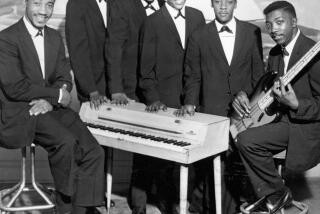‘Everywhere I’ve ever been, I was a cowboy. . . . I’m still a cowboy.’
- Share via
Ruby Williams has faced danger, disease and death repeatedly in his 100 years of life, he says, and always without fear. As a mechanic in Arlington, Tex., he nearly drowned in a deluge of gasoline as he lay trapped beneath a car. Another time, scarlet fever robbed him of his eyesight for several days. Doctors once proclaimed he would never walk again when he got zinc poisoning in his foot. But most terrifying, he recalls, was a herd of stampeding cattle. Born March 16, 1888, and raised as a cowboy on Alamo Allen’s Ranch in Hubbard City, Tex., Williams has seen and done a lot. Now a “retired” cowboy, Williams volunteers his time driving seniors on errands and to and from programs at United Way facilities. He recently was named United Way’s “Retired Senior Volunteer of the Year.” Times staff writer Caroline Lemke interviewed him in his Southeast San Diego apartment. Bob Grieser photographed him.
I’m just a cowboy. You know, people have a gross misconception of what a cowboy is. They think a cowboy is somebody going around with two big guns, shooting the town up. Now this is a far cry from what a cowboy does.
Here’s all a cowboy does: he’s a man who tends cattle. We looked after cattle. In the calving season, you have to watch the little calves to keep them from getting worms in their navel. Little guy, after he’s born, he’s got a little navel string, and, if you don’t watch them, flies get in ‘em. So we rope ‘em and doctor their little navels up with medication. We had to watch the cows.
A lot of times, cows come up with a disease known as pink eye. So, we find a cow with pink eye and we rope him and doctor him up and turn him loose. It’s just a matter of tending cattle. When we’re not doing that, we are repairing fences, digging post holes and keeping up the ranch. There were no outlaws.
I worked for $30 a month. That was top pay for a good cowboy. All the years back from the time I was born until just a few years ago, a cowboy didn’t get no money. It was free and clear, though. We had the bunkhouse, and they fed us a lot of navy beans and jerky.
The black cowboy has been here all the time. Somebody said, ‘I didn’t know they had black cowboys.’ I said, ‘Sure, we had black cowboys. We opened the West up.’ Yes sir.
I’ve been all over the country because I was with Williams’ Carnival. At that time it was the biggest carnival in the world. I’d say, ‘To heck with the ranch,’ then I’d run around with the shows. I was with the Old Buffalo Bill Show.
I’ve worked on the railroad, laying steel, doing what you call extra gang work. It takes big, husky men to do it. You don’t have to be smart to do that. If I had been smart, I wouldn’t have had to do that. But what I done, it didn’t take anything but horsepower and horse sense, and I had plenty of both of it because I was young. You had to do anything you could find to do. You couldn’t be choicey then.
I’ve never been afraid of anything, but you haven’t seen anything so terrifying in your life as a cattle stampede. I remember one year we was loading about 3,000 head of cattle onto this train. We were going to Oklahoma. The cattle went crazy. Luckily all of our horses were way up high by the engine. The cattle went across Old Man Schwartz’s porch and headed down into Texas--we were just a mile from the Texas line. This guy had a sweet-potato patch they dug up like they were a plow. They just ripped off everyone’s porch in town. You got to get out of the way is the first thing, then when you ride herd on a bunch of cattle, you ride away from them and keep your distance until they slow down. They get tired after a while, then you can do something with them. But, when they’re scared and running, you can’t do nothing with them. They’ll run right over you.
Everywhere I’ve ever been, I was a cowboy. I’m in San Diego, California this day; I’m still a cowboy. Once a cowboy, you’re always a cowboy. It never gets out of you.
More to Read
Sign up for Essential California
The most important California stories and recommendations in your inbox every morning.
You may occasionally receive promotional content from the Los Angeles Times.










